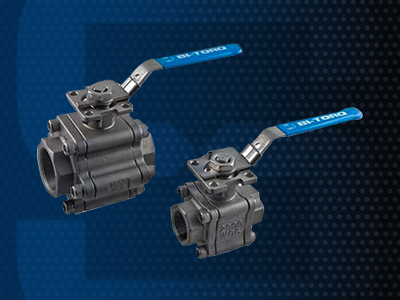Blog
The Basic Facts About PVC, Brass, & Stainless Steel Ball Valves
January 24, 2020

Since 1995, BI-TORQ Valve Automation, a division of Strahman Valves, has been a preeminent provider of PVC, CPVC, brass, and stainless steel ball valves, plus actuators. We specialize in automated and manual valve packages for a variety of industries and applications, including:
- Oil and Gas Industry
- Municipal and Commercial Applications
- Chemical and Plastic Manufacturing
- Food and Beverage Industry
- Industrial Machinery
We offer an assortment of valve designs, depending on the needs of the application. Our selection includes ball valves, butterfly valves, and actuators. We are pleased to offer a full selection of both automated and manual ball valves.
Our manual quarter-turn valves come in 1/4” – 4” sizes, and most include OSHA-approved locking mechanisms. ISO mounting pads are available on virtually all of our manual ball valve designs, in case there is need for automation later.
Like the manual ball valves, our automated ball valve packages are also available in 1/4” – 4” sizes. They can be purchased with either pneumatic or electrical actuators, in both 2-way and 3-way designs. Our automated ball valve systems come fully assembled and tested, so that they can be immediately installed and put to use.
Our manual and automated ball valve designs come in a range of materials. To ensure you’re using the best material for a given application, it’s important to understand the strengths and weaknesses of each one. For easy reference, we have compiled a summary of the different ball valve materials and their uses.
Stainless Steel Ball Valves
Stainless steel ball valves offer many advantages, especially for high pressure applications, corrosive chemicals, and harsh environments, including:
- Durability: They exhibit high tensile strength and hardness, which makes them difficult to damage, and are highly resistant to extreme temperature and pressure.
- Corrosion Resistance: The valves are blended with chromium to create an oxidized corrosion-resistant surface, which makes them resistant to rust and corrosion.
- Cost-Efficiency: They are less expensive than other types of valves, and because of their durability and corrosion-resistance, you don’t need to worry about frequently replacing them, leading to a longer service life and lower maintenance costs.
Stainless steel ball valves are used in an array of applications, including:
- Crude Oil Refineries
- Marine Environments
- Paint Production
- Brewing Systems
- Agriculture
Brass Ball Valves
Brass has been a popular material for ball valves in the oil and gas industry, chemical manufacturing, and water treatment for years. It was previously manufactured with lead, which made it a poor choice for drinking water and food and beverage applications; however, newer brass alloys can be created with or without lead.
Brass is softer than stainless steel and easier to shape and mold into ball valve components. It’s corrosion-resistant except when exposed to chlorine, which can corrode brass over time.
Due to their softer nature, bronze ball valves are often used in lighter industrial and municipal applications, such as:
- LP and Natural Gas Conveyance
- HVAC Applications
- Residential and Commercial Water
- Compressed Air
PVC and CPVC Ball Valves
Polyvinyl chloride, or PVC, is a useful thermoplastic material used in valves for piping systems composed of the same material. PVC valves are lighter than their metal counterparts, inexpensive to produce, and highly corrosion-resistant, which makes them useful in both residential and industrial applications. However, PVC is not suitable for high temperature uses, as it will melt or warp at temperatures above 140° F.
PVC ball valves are used anywhere extensive PVC piping is found, including:
- Plumbing Pipes
- Irrigation Systems
- Pool and Spa Pipes
- Chemical Production
- Electric Conduits
Chlorinated polyvinyl chloride, or CPVC, is similar to PVC in that it is lightweight, corrosion-resistant, and inexpensive. The additional chlorination allows CPVC to withstand higher temperatures up to 200° F, and makes it less susceptible to bacterial growth.
CPVC ball valves are useful for a variety of applications, such as:
- Drinkable Water Distribution
- Fire Sprinkler Systems
- Corrosive Chemical Conveyance
Choose BI-TORQ for Your Valve Automation Needs!
With a wide range of materials to choose from, BI-TORQ will have the right valve for your needs. Our automated and manual ball valve packages are available in an array of designs to suit any application.
For more information on our high quality PVC, brass, and stainless steel ball valves, contact us today or request a quote.
